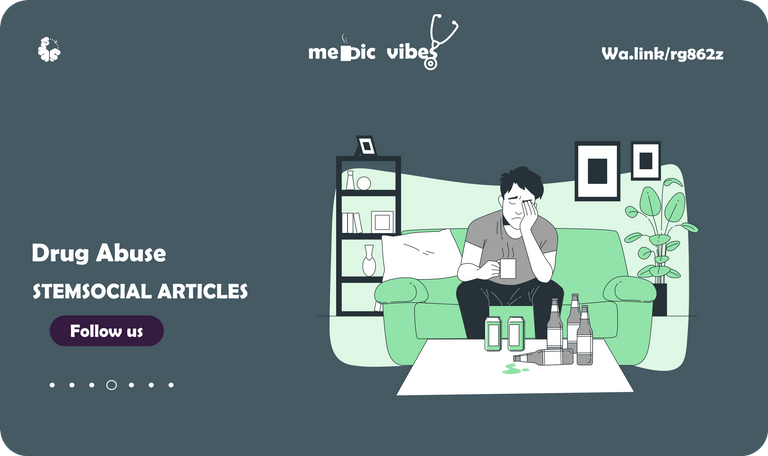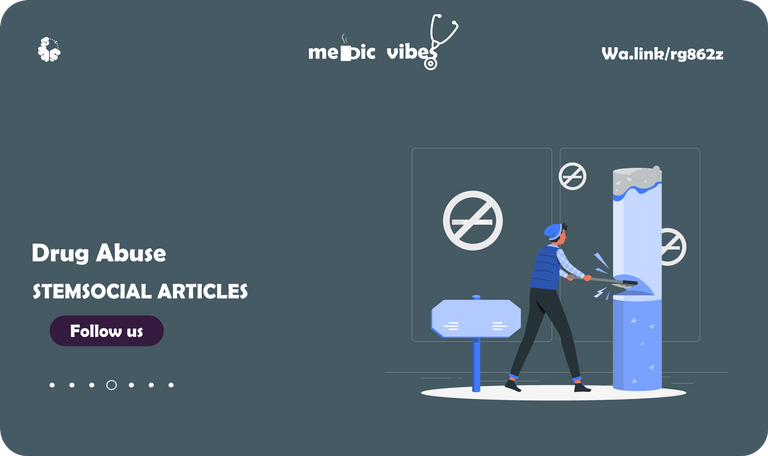In the last post, we saw how:
- Diagnosis of substance use disorder based on patterns of use.
- Nigeria is putting in efforts to combat drug abuse, trafficking, and addiction through multiple agencies and laws.
- Treatment of comorbidity in drug dependent mentally ill is challenging; integrated treatment is most effective.
Welcome to Medic Vibes, where we discuss mental health disorders and make sense of them. Dr Ebingo Kigigha is a medical doctor (aspiring psychiatrist) and creative person (illustration and music). This has been our routine for four consecutive months. This month will be dedicated to substance abuse. In the first month, we discussed Depression, and in the subsequent month, anxiety. We just finished with Conduct disorders.
In this post, we are looking at A Nigerian Study on Substance Abuse. To learn more just keep scrolling down. You can also skip to the key point of the post if you which or go to the conclusion to get the summary.

A patient is noted to have been intoxicated when there are symptoms and signs that are related to a drug that was ingested or used, for example, alcohol intoxication and drunkenness. When intoxication is being characterized, there are certain factors like if it is reversible and related to the particular substance that was taken.
In different substances, it is possible to see similar signs and symptoms. Clinically significant maladaptive behavioral or psychological changes that are due to the effect of the substance on the central nervous system (e.g., belligerence, mood lability, cognitive impairment, impaired judgment, impaired social or occupational functioning) and develop during or shortly after use of the substance.
The features that are seen in intoxication can not be accounted for by any other medical condition and if they were, the patient would be either treated for a mild condition or referred to a specialist. Substance Withdrawal Substance withdrawal is the diagnosis used to describe a substance-specific syndrome that results from the abrupt cessation of heavy and prolonged use of a substance (e.g., opioid withdrawal).
A general description of substance withdrawal requires the following criteria to be met: The development of a substance-specific syndrome due to the cessation of (or reduction in) substance use that has been heavy and prolonged. The substance-specific syndrome causes clinically significant distress or impairment in social, occupational, or other important areas of functioning.
The symptoms are not due to a general medical condition and are not better accounted for by another mental disorder. In the discussion of each substance in the sections that follow, the generic tables listed above

Substance Abuse in Nigeria (Recommedations & Conclusion)

Image by storyset on Freepik
What the studies show is that there should be thoughtful measures to attempt dealing with drug abuse in Nigeria. These measures should take into consideration the specific demographics that are typically affected by this problem. Everyone should be included in dealing with drug abuse, from the community level to the federal government level. There are many lines of action, and one party can only do so much.
The government needs to have more jobs available for young people and go through the laws to make it a punishable offense to use drugs. There should be money put into programs that combat drug abuse. The available deterrents should be enhanced to ensure that they function as they should on every level of society.
The country should be heavily guarded against drug traffickers, especially at the borders.
The theoretical bases of protecting people from the harm of drug use should be put into practice, especially those that were developed by the Group-focused Cognitive Behavioral Health Education Program (GCBHEP) as they have been noted to cause the most change. This concept utilizes mass media such as media prints, social media, banners, billboards, radio adverts, and religious announcements that can be made and disseminated.
There should be better enlightenment programs that reach high schools to ensure that they are educated about the dangers of drug use. If there are some of these measures in place, then they need to be reviewed and strengthened where they are weak.
Parents and guardians should put in more effort to explain the dangers of drug abuse to their children. They should be taught as much as they can so that they are aware of the fact that drug abuse can start at an early age.
Some of the things that affected this meta-analysis is the fact that there is limited information about the topic. The information that was gathered was from 2 databases. It is possible that there may have been some not worthy studies that may have been excluded from the study.
Another fact is that there is no clear knowledge on if the studies were done properly.
They concluded the paper by explaining that there is clearly a problem epidemiologically as shown by the prevalence. The younger population of males specifically those in high school and university, students were more affected by this problem. There was also a high prevalence among drivers.
The drugs that were more likely to be abused were cannabis, amphetamine, codeine, and heroin. The main sources through which people were getting these drugs were from pharmacists, hawkers, and friends. Most people abuse drugs to make themselves more effective at work, while some took it for pleasure.
Those who were lower in the socio-economic ladder, had friends who abused drugs, or were not doing well in school were more likely to abuse drugs also. Drug abuse in Nigeria has caused schizophrenia, psychosis, and other admittable conditions.

Treatment
Those who are severely affected by mental health conditions like schizophrenia and schizoaffective disorder are usually more difficult to treat. Even though some facilities have all the medication necessary, it is usually very difficult to treat these cases even with the appropriate antipsychotics.
It is best that one practitioner can take on treatment for substance abuse and addiction but some institutions take on the care for mental health issues and addiction separately.
The reach of management into the public sphere has led to a reduced prevalence of alcoholism among the general public. There is also a short outpatient counselling schedule that is useful for private-sector alcoholics and those who have developed a dependence on illicit drugs and do not have support from family and friends.
In recent times care is more streamlined to that which cost the least over a short time.
Treating those who are in a prison can reduce the cost of medical care and the need to rearrest them. It is usually a difficult case to manage whether it be managed in the public or the private sector. This difficulty could be attributed to the fact that there is a reduced moral strong hold on the patient rather than a failure of the treatment.
Questions
- What did you learn about Substance abuse?
Conclusion
- Difficult to treat schizophrenia, addiction, using separate facilities and practitioners.
- Recent efforts focus on cost-effective care, including treating prisoners to reduce recidivism.
- Substance Intoxication and Withdrawal refer to the effects of drugs on behavior and the body, caused by ingestion or cessation of use. Drug abuse in Nigeria affects students, drivers and those lower on socio-economic ladder.

References
- Kaplan-Sadocks-Comprehensive-Textbook-Psychiatry
- Page demarcations made with Inkscape.org
- Healthline
- NIMH
- WHO


Thanks for your contribution to the STEMsocial community. Feel free to join us on discord to get to know the rest of us!
Please consider delegating to the @stemsocial account (85% of the curation rewards are returned).
You may also include @stemsocial as a beneficiary of the rewards of this post to get a stronger support.